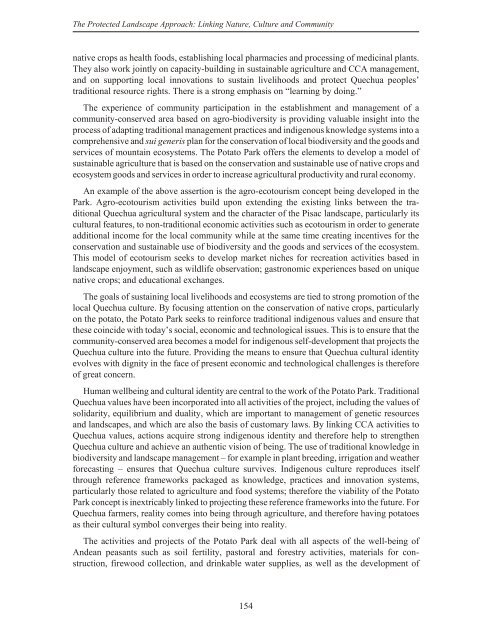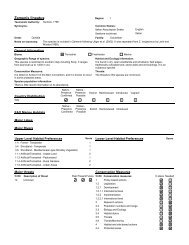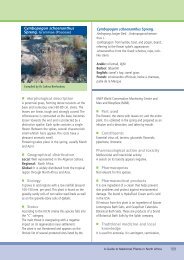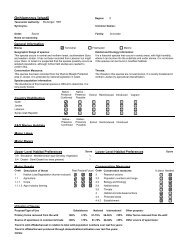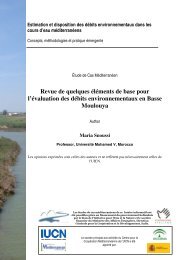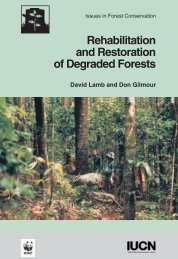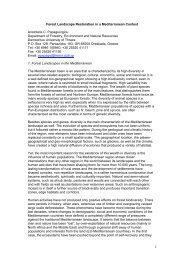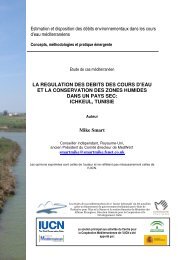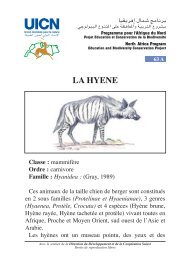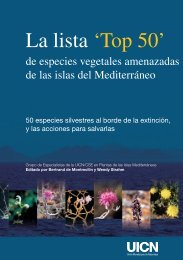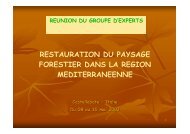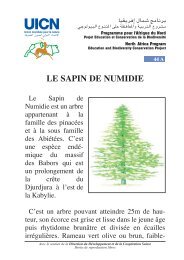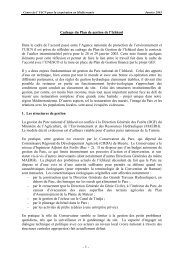The Protected Landscape Approach - Centre for Mediterranean ...
The Protected Landscape Approach - Centre for Mediterranean ...
The Protected Landscape Approach - Centre for Mediterranean ...
Create successful ePaper yourself
Turn your PDF publications into a flip-book with our unique Google optimized e-Paper software.
<strong>The</strong> <strong>Protected</strong> <strong>Landscape</strong> <strong>Approach</strong>: Linking Nature, Culture and Community<br />
native crops as health foods, establishing local pharmacies and processing of medicinal plants.<br />
<strong>The</strong>y also work jointly on capacity-building in sustainable agriculture and CCA management,<br />
and on supporting local innovations to sustain livelihoods and protect Quechua peoples’<br />
traditional resource rights. <strong>The</strong>re is a strong emphasis on “learning by doing.”<br />
<strong>The</strong> experience of community participation in the establishment and management of a<br />
community-conserved area based on agro-biodiversity is providing valuable insight into the<br />
process of adapting traditional management practices and indigenous knowledge systems into a<br />
comprehensive and sui generis plan <strong>for</strong> the conservation of local biodiversity and the goods and<br />
services of mountain ecosystems. <strong>The</strong> Potato Park offers the elements to develop a model of<br />
sustainable agriculture that is based on the conservation and sustainable use of native crops and<br />
ecosystem goods and services in order to increase agricultural productivity and rural economy.<br />
An example of the above assertion is the agro-ecotourism concept being developed in the<br />
Park. Agro-ecotourism activities build upon extending the existing links between the tra -<br />
ditional Quechua agricultural system and the character of the Pisac landscape, particularly its<br />
cultural features, to non-traditional economic activities such as ecotourism in order to generate<br />
additional income <strong>for</strong> the local community while at the same time creating incentives <strong>for</strong> the<br />
conservation and sustainable use of biodiversity and the goods and services of the ecosystem.<br />
This model of ecotourism seeks to develop market niches <strong>for</strong> recreation activities based in<br />
landscape enjoyment, such as wildlife observation; gastronomic experiences based on unique<br />
native crops; and educational exchanges.<br />
<strong>The</strong> goals of sustaining local livelihoods and ecosystems are tied to strong promotion of the<br />
local Quechua culture. By focusing attention on the conservation of native crops, particularly<br />
on the potato, the Potato Park seeks to rein<strong>for</strong>ce traditional indigenous values and ensure that<br />
these coincide with today’s social, economic and technological issues. This is to ensure that the<br />
community-conserved area becomes a model <strong>for</strong> indigenous self-development that projects the<br />
Quechua culture into the future. Providing the means to ensure that Quechua cultural identity<br />
evolves with dignity in the face of present economic and technological challenges is there<strong>for</strong>e<br />
of great concern.<br />
Human wellbeing and cultural identity are central to the work of the Potato Park. Traditional<br />
Quechua values have been incorporated into all activities of the project, including the values of<br />
solidarity, equilibrium and duality, which are important to management of genetic resources<br />
and landscapes, and which are also the basis of customary laws. By linking CCA activities to<br />
Quechua values, actions acquire strong indigenous identity and there<strong>for</strong>e help to strengthen<br />
Quechua culture and achieve an authentic vision of being. <strong>The</strong> use of traditional knowledge in<br />
biodiversity and landscape management – <strong>for</strong> example in plant breeding, irrigation and weather<br />
<strong>for</strong>ecasting – ensures that Quechua culture survives. Indigenous culture reproduces itself<br />
through reference frameworks packaged as knowledge, practices and innovation systems,<br />
particularly those related to agriculture and food systems; there<strong>for</strong>e the viability of the Potato<br />
Park concept is inextricably linked to projecting these reference frameworks into the future. For<br />
Quechua farmers, reality comes into being through agriculture, and there<strong>for</strong>e having potatoes<br />
as their cultural symbol converges their being into reality.<br />
<strong>The</strong> activities and projects of the Potato Park deal with all aspects of the well-being of<br />
Andean peasants such as soil fertility, pastoral and <strong>for</strong>estry activities, materials <strong>for</strong> con -<br />
struction, firewood collection, and drinkable water supplies, as well as the development of<br />
154


